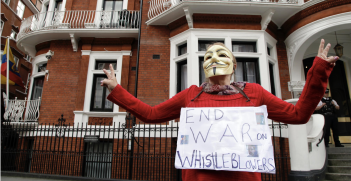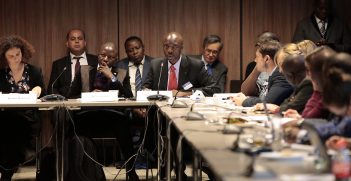Book Review: The Most Dangerous Man in the World

The long saga of WikiLeaks continues and Julian Assange now faces extradition to the US to be tried for espionage. Andrew Fowler’s third update of his book completes the record to 2020.
Julian Assange has missed court hearings in London for the last three months due to poor health, COVID-19, and Belmarsh prison’s failure to provide a videolink. When the full extradition hearing resumes on 7 September, the US will enter a new “superseding” indictment against him for espionage, solicitation, and theft of classified information.
Anyone who isn’t familiar with the Julian Assange and WikiLeaks saga must have been self-isolating for at least ten years. Australian journalists were quick to take notice: in 2010 Andrew Fowler interviewed Assange for ABC “Foreign Correspondent” and Mark Davis for SBS. Articles by Robert Manne and John Pilger followed. Melbourne writers Binoy Kampmark and Caitlin Johnstone have since taken up the story.
Assange’s brand soared and was trashed in the space of a decade. The international mainstream media now bombards him and WikiLeaks with mud – some 27 smears according to Johnstone. Sleaze can be made to stick to anyone who embarrasses the US authorities or challenges their power. In the Australian media’s echo-chamber, most commentary on WikiLeaks comes from American sources. Fowler’s ABC colleague Sally Neighbour, after producing a “4 Corners” interview with Hillary Clinton, re-tweeted that Assange was “Putin’s bitch.” In the third re-issue of Andrew Fowler’s engaging book, he shows how this has happened to Assange.
Fowler’s updated story does not follow the line put out by most Australian politicians. Kevin Rudd and Scott Ludlam have supported Assange, joined lately by Bob Carr, Rex Patrick, and a handful of others, but none of them is a Liberal. Assange has been made an example of by all three conservative Anglo-allied governments. Americans want him executed, and Senator Joe Biden has called him a “high-tech terrorist.” British judges say he’s a narcissist and “no-one is above the law.” And Scott Morrison asserts that he must “face the music.” Their common aim is clearly to stop future publishers of leaked Anglo-allied secrets in their tracks.
In fact, Wikileaks has published many documents critical of many countries, including Russia. Assange, Fowler reports, vehemently rejects accepting exile in Moscow. So what else, as John Cleese asked about the Romans, have Assange and WikiLeaks done for us?
Before WikiLeaks was famous, they exposed a Swiss bank tax scam in the Cayman Islands operating on behalf of wealthy clients in many countries. They revealed bank malfeasance in Iceland and presidential corruption in Kenya. The “Iraq War Logs” revealed that the US turned a blind eye to torture. “Collateral Murder” showed an American helicopter crew killing unarmed civilians. WikiLeaks posted the US Ministry of Defence’s Manual for Security, which declared journalists posed the same security threat as foreign intelligence services, criminals, terrorist groups, and disaffected staff. They published the official manual for treatment of prisoners in Camp Delta at Guantánamo Bay. They even put out a report on WikiLeaks itself from the US Army Counter-Intelligence Centre.
WikiLeaks published thousands of internal emails from Sony Pictures, showing how large corporations circumvented the laws on political donations. WikiLeaks put out half of Hillary Clinton’s emails as Secretary of State, showing she ordered phone interception of friends and enemies at the UN. They released John Podesta’s emails, which indicated Clinton knew Saudi Arabia and Qatar supported Islamic State, America’s nominal enemy. Then, perhaps most significantly, WikiLeaks released “Vault 7” documents revealing the hacking methods of the CIA, and showing that creating false “fingerprints” to hack Russia was established CIA practice.
WikiLeaks didn’t endear themselves to the British either. They published the full membership list of the neo-Nazi British National Party, which included police officers. Later came the Saudi Files, revealing the UK’s secret deal with Saudi Arabia to ensure both states were elected to the UN Human Rights Council.
As for Australia, among other things, they published US diplomatic cables naming Australians who were the US Embassy’s “protected” sources. They also revealed that the Australian government sought no promise from the US that Assange would not be prosecuted, but merely requested advance notice of action against him.
US authorities tried to cut off donations to WikiLeaks and to silence leakers like Chelsea Manning, Edward Snowden, and others. But WikiLeaks kept receiving and publishing documents, which Assange said was not theft or espionage on their part. Or, if it was, then The New York Times, The Washington Post, The Guardian, Der Speigel, and Le Monde could equally be prosecuted. Fowler cites Assange’s argument that if he is not a journalist, then he is their source and they should protect him.I If he is not a publisher, then journalists writing in their online editions aren’t publishers either.
Now, thanks to the British government, Assange, guilty of nothing and ill, is in Belmarsh prison, where at least three deaths from COVID-19 have occurred. He is denied proper access to his lawyers and documents. In the Embassy of Ecuador, he was invigilated for at least two years by UC Global, a Spanish security firm which passed sound, video, and phone records of everything he said and did to the CIA. As Fowler observes, that alone should be grounds for acquittal in the US. The next move will be for the American prosecutors, who claim First Amendment rights do not apply to a foreign national.
The American wife of an American intelligence officer fled from Britain to the US in August last year after driving on the wrong side of the road and killing a 19-year-old man. A CIA agent herself, she will not be extradited to the UK. Yet under the same US/UK extradition treaty, Assange will be extradited to the US, if the American case succeeds. British judges, Australian prime ministers, and our shared legal system will have failed a man who has killed no one.
Assange admires and has corresponded with Daniel Ellsberg. If precedent counts for anything, the case against Ellsberg for espionage in 1973 failed not because of his First Amendment right to publish the “Pentagon Papers,” but because the White House illegally wiretapped his phone and broke into his doctor’s office. He was, Fowler reminds us, “the first person to be accused of espionage for revealing information to the American public.” Assange could be next.
Dr Alison Broinowski AM FAIIA is an author, and academic, a former Australian diplomat and fellow of the Australian Institute of International Affairs. Her areas of academic endeavor include Australia-Asia relations, Australia and the United Nations, the Australian-American alliance, new journalism, and public and cultural diplomacy. In 2013, Dr Broinowski a former Senate candidate for the Australian Wikileaks Party.
Review of Andrew Fowler’s, “The Most Dangerous Man in the World: Julian Assange and WikiLeaks’ fight for freedom,” updated edition, Melbourne University Press, 2020.





